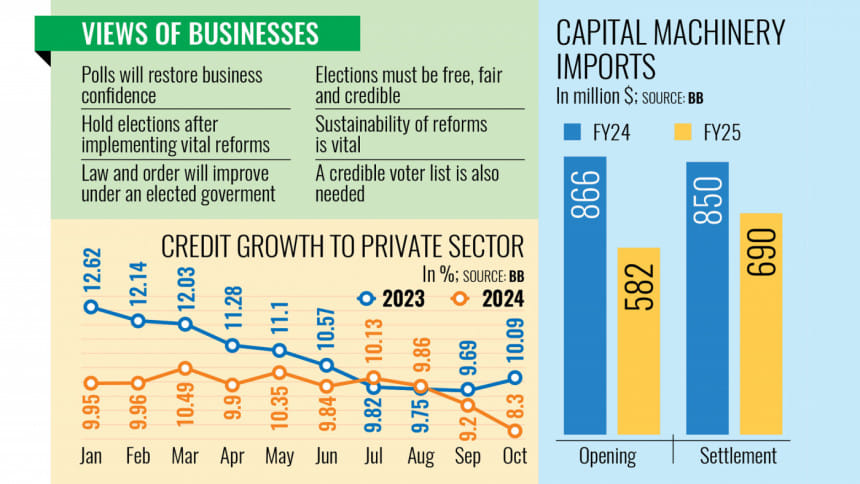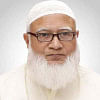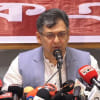Election to boost business confidence: entrepreneurs

Business leaders, economists and professionals have emphasised that an elected government is essential for restoring confidence in the business community, stabilising law and order, and revitalising the business and investment climate.
They also welcomed the speech delivered by Chief Adviser Muhammad Yunus yesterday as he assured that general elections would be held by the end of 2025 or in early 2026, subject to the completion of vital reforms.
Yunus made the much-anticipated announcement about when the interim government, which assumed power in early August, may organise national elections in his address to the nation on Victory Day.
Members of the business community also echoed that vital reforms in different sectors, which the interim government is currently working on, must be completed before holding the next general election.
Bangladesh's economy has been suffering from a slowdown in recent years, depressed by high inflation, reducing purchasing power, rising interest rates, and slowing private sector credit growth. Imports of capital machinery, another key indicator of private investment and job creation, have also been on the downturn.
In October, private sector credit growth slowed to 8.3 percent year-on-year from 10.09 percent. Meanwhile, letter of credit openings for capital machinery imports dipped 33 percent year-on-year to $582 million in the first four months of this fiscal year, according to the Bangladesh Bank data.
"It is better to hold the elections after completing at least the pressing reforms. Of course, free and fair elections will stabilise the law-and-order situation and help restore confidence to businessmen," said Faruque Hassan, a former president of the Bangladesh Garment Manufacturers and Exporters Association.
Abdul Hai Sarker, chairman of the Bangladesh Association of Banks, said the chief adviser's targeted timeline for elections allowed room to implement important reforms.
Sarker said it is generally accepted that businessmen are not critical of the timeline, adding that the move would restore confidence to businessmen.
"The law-and-order situation will have to be controlled gradually. These tasks will be easier for an elected government," Sarker said.
Mohammad Hatem, president of the Bangladesh Knitwear Manufacturers and Exporters Association, echoed Sarker's views.
"State affairs must be managed by an elected government," Hatem said.
However, staging the elections may require more time if reforms take longer to implement.
"I want to say: first reforms, then elections," Hatem told The Daily Star, adding that reforms were ignored during the past government's 15-year tenure.
Kamran T Rahman, president of the Metropolitan Chamber of Commerce and Industry, said businessmen want and expect the interim government to organise free and fair elections.
Mohammed Amirul Haque, managing director and chief executive officer of Premier Cement Mills, said the chief adviser's speech showed a way forward and was very prudent.
"A stable government is very much needed through the people's mandate," Haque said.
The growth of the economy can be ensured by holding free and fair elections, he said, adding that people expect the interim government to stage free and fair elections.
Zaved Akhtar, president of the Foreign Investors' Chamber of Commerce & Industry, said a democratically elected government can foster a good business and investment environment in Bangladesh by implementing some reforms recommended by the interim government.
It also said it is looking forward to discernible improvements from the Bangladesh Investment Development Authority, National Board of Revenue and Bangladesh Bank in terms of policies, processes and systems.
"We believe this can bear fruits for the long term and have a far-reaching impact on fostering a positive investment climate in Bangladesh," he said, adding that longer-term investment and trade policies would also bolster business confidence.
Syed Mahbubur Rahman, a former chairman of the Association of Bankers, Bangladesh, said that it is difficult for an interim government to implement many reforms.
"Entrepreneurs may wait and see how the elections are going to be held. Afterwards, they may invest. The country's economy is going through a rough patch. The year 2025 is going to be a difficult year in terms of the economic situation," he said.
"The projected amount of revenue may not be collected, so the government will go to banks to borrow. Gross domestic product growth may also slow, so money flow to the banking sector may shrink. This may create a liquidity pressure in the banking sector."
Mustafizur Rahman, a distinguished fellow at the Centre for Policy Dialogue, said economic uncertainty will be removed through fair elections while creating a sense of positivity.
"At the same time, the continuation of reforms is similarly important. It is expected that the next elected government will continue the reforms and implement those sincerely."
It is also expected that the political leaders will come to an agreement on the durability and certainty of reform activities, the economist also said.
"Otherwise, the establishment of good governance and transformation to democracy to create an inclusive society and free media might not be possible. The government will have to ensure the sustainability of the reforms," he added.
It is good that the chief adviser set a timeframe, he said, reasoning that it would give political parties the time to reach a consensus on different issues.
Mohammad Abdur Razzaque, chairman of Research and Policy Integration for Development (RAPID), said major economic challenges continue to persist despite the interim government's measures.
"Vital reforms should be implemented on a priority basis and the next elected government should continue the reforms."
A democratic transition is very important, he said, adding that a fair voter list is also important.


 For all latest news, follow The Daily Star's Google News channel.
For all latest news, follow The Daily Star's Google News channel. 








Comments